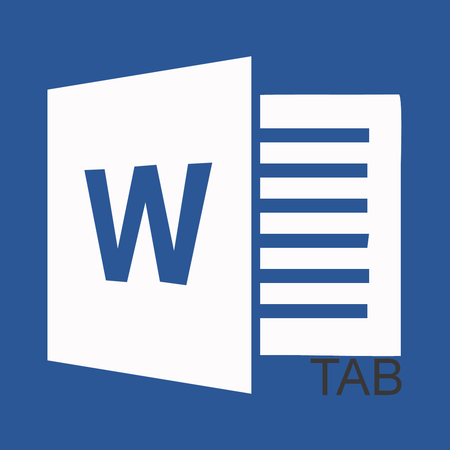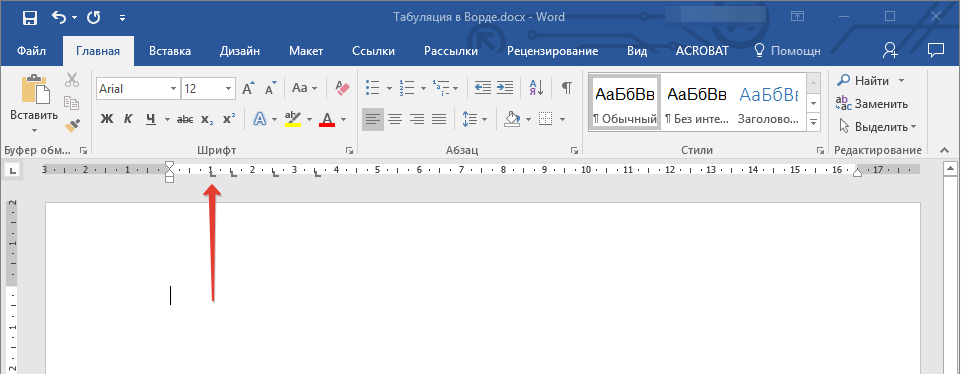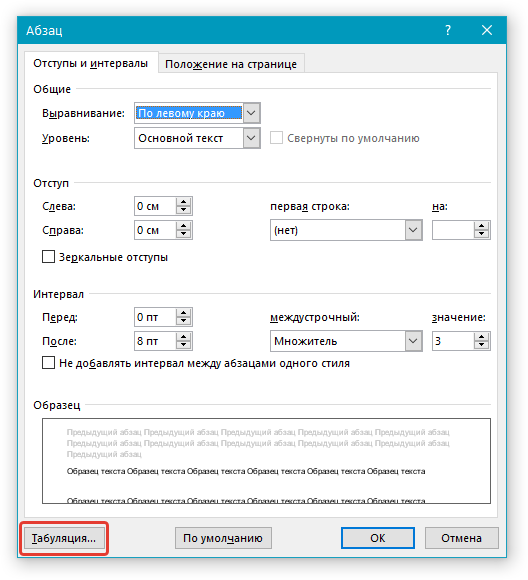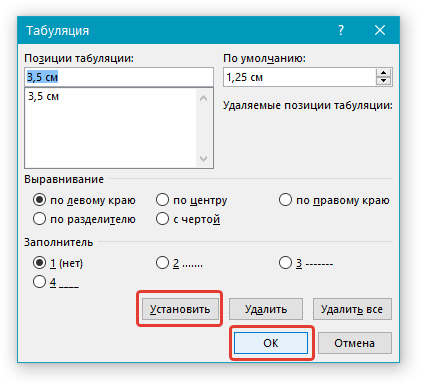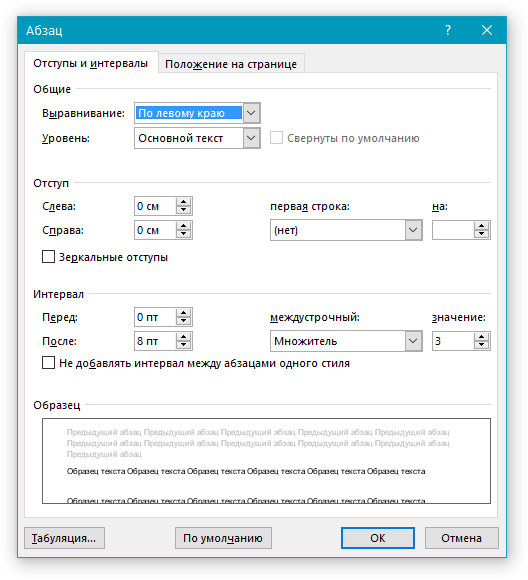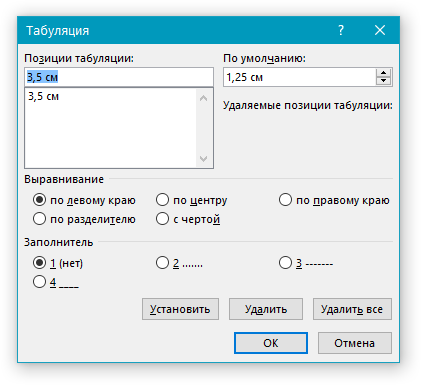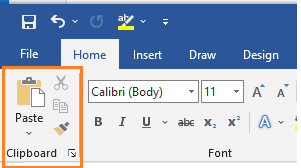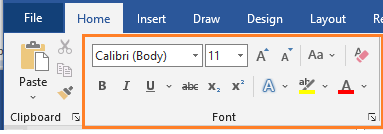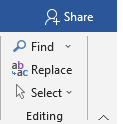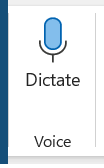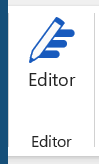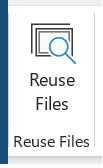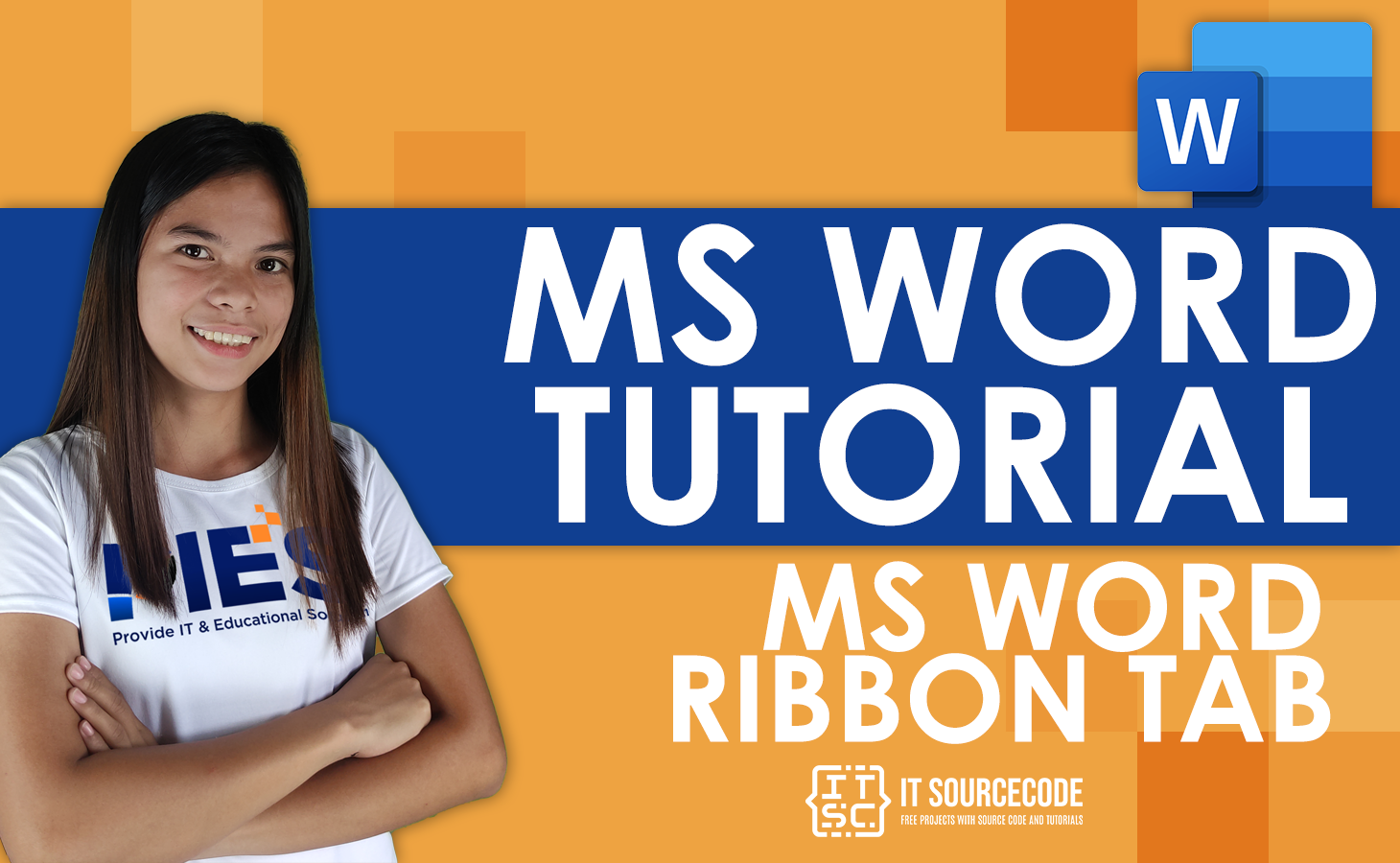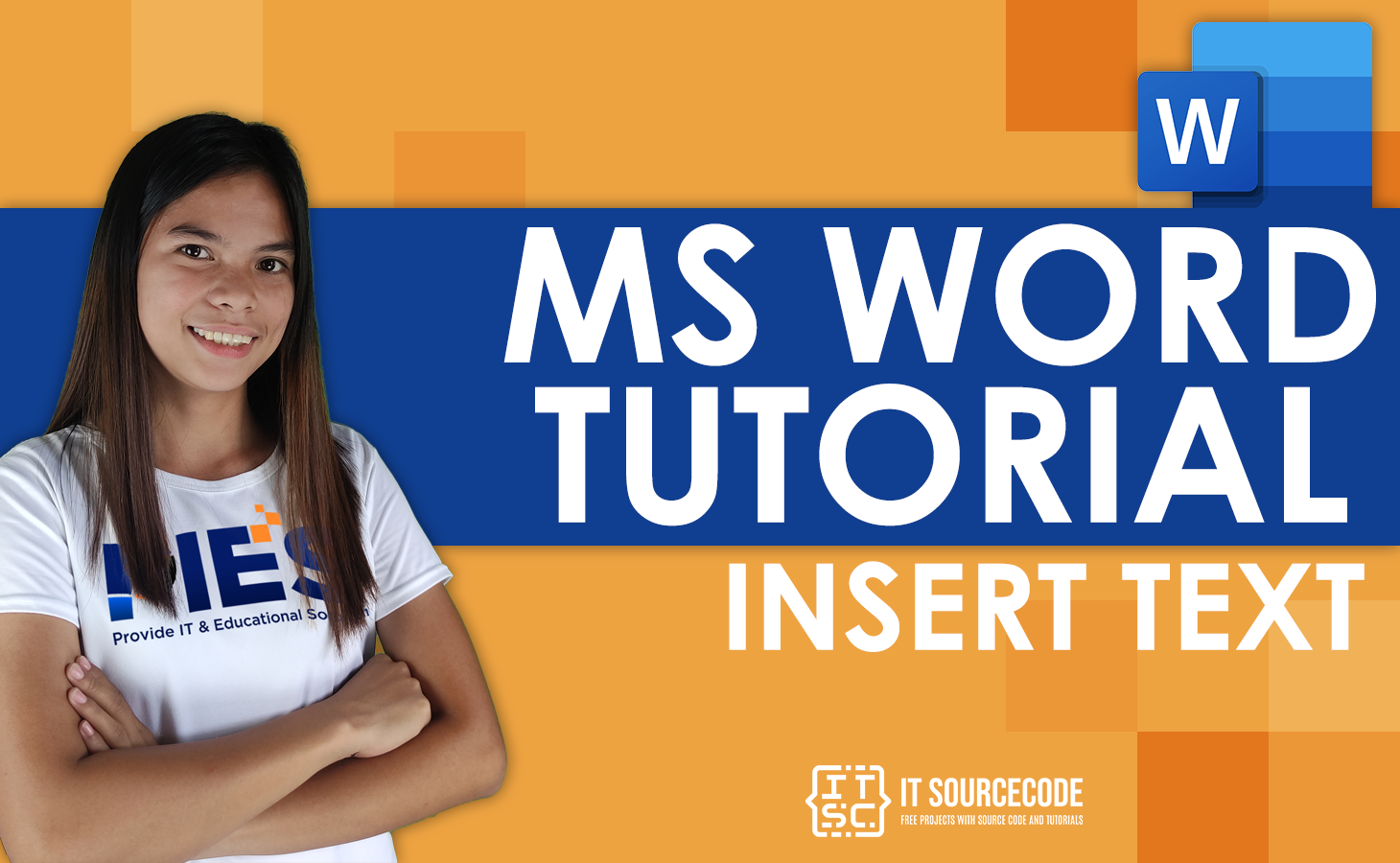
Important Note: Although tabs can be used to indent paragraphs, Word’s built-in indent options are more efficient and reliable for longer documents. See “Three Ways to Indent Paragraphs in Microsoft Word” for more information.
Before starting the tutorial, let’s look at the different types of tab stops you can use in Word.
Five Types of Tab Stops in Word
Word includes five different tab stops:
- The left tab places left-aligned text to the right of the tab stop. (This is the most common tab stop.)
- The center tab centers text on the tab stop.
- The right tab places right-aligned text to the left of the tab stop.
- The decimal tab aligns text based on the first decimal placed on the tab stop.
- The bar tab creates a vertical line at the tab stop. (Technically, this is not a tab; it is for formatting multi-column lists.)
This tutorial is available as a YouTube video showing all the steps in real time.
Watch more than 150 other writing-related software tutorials on my YouTube channel.
The images below are from Word for Microsoft 365. The steps also apply to Word 2021, Word 2019, Word 2016, Word 2013, and Word 2010.
How to Change Word’s Default Tab
By default, Word moves your cursor half an inch to the right when you press the Tab key on your keyboard. However, you can change the length of your default left tab stop without creating a new tab.
The following steps only affect your current document. If you want to change the default tab for all future documents, you have to modify your normal.dotm template. We will cover that advanced topic in a separate tutorial.
- Select the Home tab in the ribbon.
- Select the dialog box launcher in the Paragraph group.
- Select the Tabs button in the Paragraph dialog box.
- Use the increment arrows to adjust the default tab stop in the Tabs dialog box. Alternatively, you can type a new number directly into the text box.
- Select the OK button to close the Tabs dialog box.
The steps below use the ruler. You can also create and adjust tabs using the Tabs dialog box. However, that process is less user-friendly than the ruler method, so it will be presented in a separate, advanced tutorial.
How to Create Tabs on the Ruler
Skip to step 3 if your ruler is already visible.
- Select the View tab in the ribbon.
- Select Ruler in the Show group.
- Press Ctrl + A on your keyboard to select your entire document or select the portion of your document to which you want to apply the tab.
If you don’t select all or part of your document before creating your new tab, it will only apply to the paragraph your cursor is currently in or newly created content.
- Click the tab selector button until it changes to the symbol representing the tab you want. (Hover your pointer over each symbol in the tab selector for a tooltip explaining each symbol.)
- Click the location on the ruler where you would like to place the tab stop. The tab symbol will then appear on the ruler.
Note that you can place multiple tab stops on the ruler. Each time you press the Tab key, your cursor will move to the next stop.
How to Change Tabs on the Ruler
- [Optional step] If you want to change the location of a tab stop and update all the text formatted with that tab, select only that text.
- Slide the cursor symbol to a new location on the ruler. If your cursor is currently in a paragraph formatted with that tab, it will automatically update.
How to Delete Tabs on the Ruler
- Ensure that no text or other content is selected.
- Pull the tab symbol downward and release it. It will be removed from the ruler.
Pro Tip: If you accidentally delete a tab, immediately press Ctrl + Z on your keyboard to undo the deletion.
Related Resources
How to Create and Customize Headings in Microsoft Word
Three Ways to Insert Accent Marks in Microsoft Word
How to View the Word Count in Microsoft Word
Updated April 13, 2022
Download Article
Download Article
Setting tabs on your Microsoft Word document will let you align the text on a page. This will organize your text so it has a uniform look to it. You can set tabs to the right or left or even both sides of the document, and doing so is very easy and straightforward.
Steps
-
1
Open Microsoft Word. On your desktop, double-click the Microsoft Word icon to launch the application.
-
2
Make the ruler visible. By default, the ruler at the top of the document should already be visible. In the case that it is not, click the View option at the very top of the screen, and a window will drop-down. Click on “Ruler” to display it at the top of the document.
Advertisement
-
3
Click the tab selector. At the top-left corner of the document, you can see the tab selector. It should be exactly on the left side of the ruler. Click it and you will be able to select the type of tab you want.
-
4
Set the tab position. Now click anywhere at the bottom edge of the ruler to set where you want the tab.
-
5
Adjust the tab. If you need some more adjusting to your tab, simply drag the tab you set left or right along the ruler.
Advertisement
Add New Question
-
Question
How do I change tabs?
To move left, press Ctrl + Tab; to move right, press Ctrl + Shift + Tab. Or you can just click on the tab you want.
-
Question
Can I set tabs when I have already made a Word document?
Yes you can. Your Word document just needs to be aligned in paragraph format, then you are able to drag the tabs where you would like them.
-
Question
How do I delete a tab in a Word document?
Click the tab stop on the ruler and drag down. Also, you can double-click the tab stop, select the position of the tab stop you want to delete, click clear, and click OK.
Ask a Question
200 characters left
Include your email address to get a message when this question is answered.
Submit
Advertisement
Thanks for submitting a tip for review!
About This Article
Thanks to all authors for creating a page that has been read 194,890 times.
Is this article up to date?
Содержание
- Устанавливаем позицию табуляции
- Устанавливаем позицию табуляции с помощью линейки
- Расшифровка параметров индикатора табуляции
- Устанавливаем позицию табуляции через инструмент “Табуляция”
- Изменяем стандартные интервалы между позициями табуляции
- Удаляем интервалы позиций табуляции
- Вопросы и ответы
Табуляция в MS Word — это отступ от начала строки до первого слова в тексте, а необходима она для того, чтобы выделить начало абзаца или новой строки. Функция табуляции, доступная в текстовом редакторе от Майкрософт по умолчанию, позволяет сделать эти отступы одинаковыми во всем тексте, соответствующими стандартным или ранее установленным значениям.
Урок: Как убрать большие пробелы в Ворде
В этой статье мы расскажем о том, как работать с табуляцией, как ее изменить и настроить в соответствие с выдвигаемыми или желаемыми требованиями.
Устанавливаем позицию табуляции
Примечание: Табуляция — лишь один из параметров, позволяющих настроить внешний вид текстового документа. Чтобы изменить его, можно также использовать параметры разметки и готовые шаблоны, доступные в MS Word.
Урок: Как сделать поля в Ворде
Устанавливаем позицию табуляции с помощью линейки
Линейка — это встроенный инструмент программы MS Word, с помощью которого можно менять разметку страницы, настраивать поля текстовом документе. О том, как ее включить, а также о том, что с ее помощью можно сделать, вы можете прочесть в нашей статье, представленной по ссылке ниже. Здесь же мы расскажем о том, как с ее помощью задать позицию табуляции.
Урок: Как включить линейку в Ворде
В левом верхнем углу текстового документа (над листом, ниже панели управления) в месте, где начинается вертикальная и горизонтальная линейки, находится значок табуляции. О том, что значит каждый из его параметров, мы расскажем ниже, а пока сразу перейдем к тому, как можно установить необходимую позицию табуляции.
1. Кликайте по значку табуляции до тех пор, пока не появится обозначение нужного вам параметра (при наведении указателя курсора на индикатор табуляции появляется его описание).
2. Кликните в том месте линейки, где необходимо установить табуляцию выбранного вами типа.
Расшифровка параметров индикатора табуляции
По левому краю: начальная позиция текста задается таким образом, чтобы по ходу набора он смещался к правому краю.
По центру: по ходу набора текст будет центрироваться относительно строки.
По правому краю: текст при вводе сдвигается влево, сам параметр задает конечную (по правому краю) позицию для текста.
С чертой: для выравнивания текста не применяется. Использование этого параметра в качестве позиции табуляции вставляет вертикальную черту на листе.
Устанавливаем позицию табуляции через инструмент “Табуляция”
Иногда возникает необходимость задать более точные параметры табуляции, чем это позволяет сделать стандартный инструмент “Линейка”. Для этих целей можно и нужно использовать диалоговое окно “Табуляция”. С его же помощью можно вставить определенный символ (заполнитель) непосредственно перед табуляцией.
1. Во вкладке “Главная” откройте диалоговое окно группы “Абзац”, нажав на стрелочку, расположенную в правом нижнем углу группы.
Примечание: В более ранних версиях MS Word (вплоть до версии 2012) для открытия диалогового окна “Абзац” необходимо перейти во вкладку “Разметка страницы”. В MS Word 2003 этот параметр находится во вкладке “Формат”.
2. В диалоговом окне, которое перед вами появится, нажмите на кнопку “Табуляция”.
3. В разделе “Позиция табуляции” задайте необходимое числовое значение, оставив при этом единицы измерения (см).
4. Выберите в разделе “Выравнивание” необходимый тип расположения табуляции в документе.
5. Если вы хотите добавить позиции табуляции с точками или каким-либо другим заполнителем, выберете необходимый параметр в разделе “Заполнитель”.
6. Нажмите кнопку “Установить”.
7. Если вы хотите добавить в текстовый документ еще одну позицию табуляции, повторите вышеописанные действия. Если же вы больше ничего не желаете добавлять, просто нажмите “ОК”.
Изменяем стандартные интервалы между позициями табуляции
Если вы устанавливаете позицию табуляции в Ворде вручную, параметры, заданные по умолчанию, перестают быть активными, заменяясь на те, которые вы задали самостоятельно.
1. Во вкладке “Главная” (“Формат” или “Разметка страницы” в Word 2003 или 2007 — 2010, соответственно) откройте диалоговое окно группы “Абзац”.
2. В открывшемся диалоговом окне нажмите на кнопку “Табуляция”, расположенную снизу слева.
3. В разделе “По умолчанию” задайте необходимое значение табуляции, которое будет использоваться в качестве значения по умолчанию.
4. Теперь каждый раз, когда вы будете нажимать клавишу “TAB”, значение отступа будет таким, как вы сами его установили.
Удаляем интервалы позиций табуляции
При необходимости, вы всегда можете убрать табуляцию в Ворде — одну, несколько или все сразу позиции, ранее установленные вручную. В таком случае значения табуляции переместятся в места, заданные по умолчанию.
1. Откройте диалоговое окно группы “Абзац” и нажмите в нем на кнопку “Табуляция”.
2. Выберите в списке “Позиции табуляции” ту позицию, которую необходимо очистить, после чего нажмите на кнопку “Удалить”.
- Совет: Если вы хотите удалить все позиции табуляции, ранее установленные в документе вручную, просто нажмите на кнопку “Удалить все”.
3. Повторите вышеописанные действия, если вам нужно очистить несколько ранее заданных позиций табуляции.
Важное примечание: При удалении табуляции, знаки позиций не удаляются. Удалять их необходимо вручную, либо же с помощью функции поиска и замены, где в поле “Найти” нужно ввести “^t” без кавычек, а поле “Заменить на” оставить пустым. После этого нажмите кнопку “Заменить все”. Более подробно о возможностях поиска и замены в MS Word вы можете узнать из нашей статьи.
Урок: Как заменить слово в Ворде
На этом все, в этой статье мы подробно рассказали вам о том, как сделать, изменить и даже убрать табуляцию в MS Word. Желаем вам успехов и дальнейшем освоение этой многофункциональной программы и только положительных результатов в работе и обучение.
Начнем с вопроса «что такое табуляция в word». Табуляция – это инструмент MS Word, который отвечает как за отступы, так и за выравнивание.
Использование табуляции в ворде намного упрощает форматирования текста. Некоторые пользователи, например, используют пробелы, чтобы перенести текст в правый угол документа. Но существуют определенные требования к оформлению некоторых электронных документов, и использование огромного количества пробелов в таких документах недопустимо. В этой статье мы рассмотрим, как сделать табуляцию в ворде.
Для ввода табуляции в ворде используется клавиша Tab. Если вы включите режим непечатаемых символах, то вы увидите, что табуляция отображается как символ 
Если вы находитесь внутри таблицы, то клавиша Tab используется для перемещения в ячейках таблицы. Чтобы создать табуляцию в таблице Word используйте сочетание клавиш Ctrl+Tab.
Управлять табуляцией в ворде нам поможет горизонтальная линейка.
Если линейка не отображается, то перейдите во вкладку «ВИД» и установите флаг для пункта «Линейка».
Табуляция в Word – Линейка и кнопка табуляции
У левого края горизонтальной линейки находится кнопка табуляции, которая отображает какой тип табуляции будет применен. При повторном нажатии на кнопку табуляции, будет изменяться значок типа табуляции. Существуют несколько типов табуляции:
 |
По левому краю |
 |
По центру |
 |
По правому краю |
 |
По разделителю |
 |
Непрерывная вертикальная черта через выделенный текст |
Для того чтобы поставить табуляцию в ворде, достаточно кликнуть мышкой по необходимому месту на горизонтальной линейке. На линейке определенными маркерами будут отмечаться все установленные позиции табуляции и выглядеть это будет примерно так:
Табуляция в Word – Линейка и маркеры табуляции
Для изменения положения позиции табуляции просто перетащите маркер табуляции влево или вправо на линейке. Для того чтобы убрать табуляцию в ворде, просто перетащите маркер табуляции за пределы линейки.
Если настройка позиций табуляции с помощью линейки не обеспечивает необходимую точность или перед позицией табуляции требуется вставить специальный символ (заполнитель), воспользуйтесь диалоговым окном «Табуляция».
На вкладке «ГЛАВНАЯ» или «РАЗМЕТКА СТРАНИЦЫ» нажмите кнопку вызова диалогового окна «Абзац».
Табуляция в Word – Кнопка вызова диалогового окна «Абзац»
В открывшемся диалоговом окне в нижнем правом углу щелкните кнопку «Табуляция».
Табуляция в Word – Диалоговое окно «Абзац»
Существует второй способ открыть окно настройки табуляции в Word. Достаточно дважды кликнуть на любом маркере табуляции на линейке.
Табуляция в Word – Окно «Табуляция»
В поле «Позиции табуляции» введите расположение, где требуется установить позицию табуляции.
В группе «Выравнивание» выберите нужный тип позиции табуляции.
Чтобы добавить позиции табуляции с точками или другим заполнителем, выберите нужный параметр в группе «Заполнитель». Нажмите кнопку «Установить», а затем кнопку «ОК».
Теоретическую часть мы рассмотрели, теперь перейдем к практическим примерам.
Чаще всего используются три типа табуляции: позиция табуляции по левому краю, позиция табуляции по правому краю, позиция табуляции по центру.
Табуляция в Word – Пример табуляции с выравниванием по правому краю, по левому краю и по центру
На изображении пунктирные линии показывают, как работают табуляции с выравниванием.
Рассмотрим следующий пример позиции табуляции по разделителю.
Табуляция в Word – Пример табуляции по разделителю
В данном случае табуляция по разделителю выравнивает числа по целой и дробной части. То есть все числа выравнены по запятой.
Следующий тип табуляции, который мы рассмотрим на примере, это табуляция «С чертой».
Табуляция в Word – Пример табуляции с чертой
При помощи табуляции с чертой можно создать непрерывную вертикальную черту через выделенный текст. У табуляции «С чертой» есть особенность – для ее добавления не нужно использовать клавишу Tab, она добавляется в текст сразу после установки ее на линейке.
И перейдем к последнему примеру – табуляция с заполнением в Word.
Табуляция в Word – Пример табуляции с заполнителем
В данном случае мы используем табуляцию, чтобы создать черту для подписи. Для этого мы используем две табуляции. Первую с выравниванием по левому краю (позиция 11 см), для того чтобы отступить от текста «Руководитель:». И вторую также с выравниванием по левому краю (позиция 14,5 см), но еще и с заполнителем, чтобы создать подчеркивание определенной длины.
Многие пользователи MS Word используют табуляцию точками для создания оглавления. Но этот способ очень неудобен и непрактичен, поэтому советуем создать автоматическое оглавление.
На этом все. Надеюсь, что теперь вы знаете, что такое табуляция в Word, как сделать табуляцию в ворде, как ее настроить и как убрать.
In this lesson, you will learn How To Use Home Tab Options In MS Word. This lesson will discuss the groups and commands available in home tab in creating word document.
Meanwhile, this is a continuation of the previous tutorial on what is MS Word ribbon and the different types of tabs in Microsoft Word, both of which are still basic components of MS Word. You can browse those guides if you are having a hard time exploring your documents.
What is Home tab in MS Word?
The Home Tab in MS Word is where you can find basic information about how text looks when it’s printed or shown online. It lets you use both direct formatting and formatting based on styles. Styles take up a lot of space in Word because they are such an important part of using it well.
The home tab is a tab or button in an in Word that takes you back to the main page. It is the default tab in Microsoft Word, Excel, PowerPoint, and other Microsoft Office programs.
Table of contents
- What is Home tab in MS Word?
- How many groups are in the home tab of MS Word?
- Home Tab in MS Word Features
- Shortcut Keys of MS Word Home Tab
- What are the Parts of Home tab in MS Word?
- Clipboard of MS Word Home Tab
- Command Button of MS Word Home Tab Clipboard
- Font Group of MS Word Home Tab
- Command of MS Word Home Tab Font
- Paragraph Group of Home Tab
- List of Commands in the Paragraph Group of the Home Tab
- Clipboard of MS Word Home Tab
- Styles Group
- Editing Group of MS Word Home Tab
- MS Word Home Tab Short Cut Keys
- Summary
How many groups are in the home tab of MS Word?
The Home tab of MS Word has five groups: Clipboard, Font, Paragraph, Styles, and Editing. A dialog box is opened when you click on the arrow in the bottom corner of a group. The dialog box gives more options and commands to format documents in one given area.
Home Tab in MS Word Features
The Microsoft Word Home tab provides many features to users, including the following.
- Change the size, type, and color of the font.
- You can make text bold or italic.
- Add or take away the color around the text that stands out.
- Text on a page can be aligned to the left, center, or right.
- Add lists with bullet points or numbers.
- Change the space between lines and paragraphs.
- Change the amount of space between lines of text.
- Text, text boxes, and tables can have borders added, changed, or taken away.
- Add or modify heading types.
- Insert a horizontal line.
- Find or switch out text.
Shortcut Keys of MS Word Home Tab
Home tab in MS Word Use this keyboard shortcut: Alt+H to see the keyboard shortcuts for items. When the button is pressed, the keys to press for each item in the Home tab are shown, as shown in the picture below.
What are the Parts of Home tab in MS Word?
The home tab contains various items that you may want to use in creating a document. These items include clipboards, fonts, paragraphs, styles, and editing.
Clipboard of MS Word Home Tab
The clipboard group can be found on the far left side of the MS Word Home Tab. It is frequently used in conjunction with the editing group, which is located on the far right side of the tab.
Clicking on the dialog launcher in the bottom right corner of this group brings up the Clipboard task pane quickly.
Command Button of MS Word Home Tab Clipboard
Here are the available commands buttons in MS Word Home Tab Clipboard
- Paste – Button with Drop-Down. The drop-down contains the commands: Paste, Paste Special and Paste as Hyperlink.
- Cut – (Ctrl + X). Cuts the current selection to the clipboard.
- Copy – (Ctrl + C). Copies the current selection to the clipboard.
- Format Painter – (Ctrl + Shift + C). Copies the formatting from one place in a document and lets you apply it somewhere else. This works across multiple documents.
Font Group of MS Word Home Tab
The Font Group of the MS Word Home Tab contains all of the character formatting commands. By clicking the dialog box launcher in the bottom right corner of this group, you can quickly display the “Font” dialog box.
Command of MS Word Home Tab Font
Here are the command buttons available in MS Word Home Tab Font.
- Font – Contains a listing of all available fonts.
- Reduce Font Size – Reduces the current selection’s font size to the next smaller size in the Font Size box.
- Increase Font Size – Increases the current selection’s font size to the next larger size listed in the Font Size box.
- Replace Case – Changes the selected text to uppercase, lowercase, or another capitalization style.
- Clear Formatting – Removes all formatting from the selected text.
- Italics – Toggles the current selection’s bold attribute.
- Underline – Buttons with Drop-Down functionality. The button toggles bold formatting for the selected text.
- Strikethrough – Creates a vertical line through the selected text.
- Subscript – Changes the selected characters to small letters below the baseline.
- Superscript – Changes the selected characters to small letters above the baseline.
- Text Highlight Color – Drop-Down Button. The No Color and Stop Highlighting commands are in the drop-down menu. They change the color of the background behind the current selection.
- Font Color – Drop-Down Button. This button modifies the font color of the current selection. The options in the drop-down menu are Automatic, Theme Colors, Standard Colors, and More Colors.
Paragraph Group of Home Tab
The Paragraph Group focuses on paragraph formatting. Users are able to create lists, adjust the indentation, sort items, correctly align text within a paragraph, adjust line spacing, add fill color to shapes, and create borders.
You can quickly open the “Paragraph” dialog box by clicking on the dialog box launcher in the bottom right corner of this group.
List of Commands in the Paragraph Group of the Home Tab
The table below shows commands in the Paragraph Group of the Home Tab together with their descriptions.
| Command Button | Description |
| Bullet Lists | Bullet lists begin in the upper left corner. The appearance of bullet lists can be customized by clicking the drop-down arrow. Indent a list item and create a sub bulleted item by pressing “Tab” on the keyboard. |
| Numbered Lists | Numbered lists are like bullet lists, but they list events in order. The drop-down arrow allows list customization. Tab creates a sub number and indents a list item. |
| Multi-Level Lists | Multi-Level Lists follow Numbered Lists. Multi-Level Lists allow users to customize sub-lists. |
| Increase/Decrease | The right increase/decrease indent icons move chosen text five spaces right or left or to the next tab. Right indentation creates sub-bullets or sub-numbers. Left indentation doesn’t. |
| Sort | The Sort icon arranges text after an increase/decrease indent. It’s for Word tables. |
| Show/Hide Paragraph Formatting | Show/Hide Paragraph group’s top right. Formatting icon reveals document formatting options. This helps users suspect erroneous document formatting. Missing formatting. |
| Paragraph Alignment | Bottom row: Paragraph Alignment. The options align the selected text to the left, center, right, and justified, which evenly distributes content between the margins. Left-aligned Word documents are the default. |
| Line & Paragraph Spacing | Paragraph alignment icons are next to Line & Paragraph Spacing. Line and paragraph spacing are set here. Spacing increases paragraph readability. Users can customize “Line Spacing Options” |
| Shading | Text, tables, and paragraphs can be shaded to change their background color. It’s for flyers and Word documents. |
| Borders | The Page Borders icon creates borders around text and paragraphs. There are endless borders. Borders divide paragraphs. |
Styles Group
A style group in the home tab is a collection of formatting attributes that you can apply to text, tables, and lists in your document to alter their appearance quickly. When you apply a style, you apply a variety of formats in a single, straightforward operation.
You can quickly toggle the display of the Styles Task Pane by clicking on the dialog box launcher in the bottom right corner of this group.
Page Formatting Styles – Creates various styles and previews them in the text.
Editing Group of MS Word Home Tab
The Editing Group is at the very right end of the MS Word Home Tab. There are three options for the Editing Group, and two of them are drop-down menus.
- Find-Button with Drop-Down. The button displays the “Find and Replace” dialog box and displays the Find tab. The drop-down contains the commands: Find and GoTo.
- Replace—This displays the “Find and Replace” dialog box and displays the Replace tab.
- Select-Drop-Down. The drop-down contains the commands: Select All, Select Objects, and Select Text with similar formatting. The Select Text will select text with similar formatting.
Voice
The voice group has a dictation command that lets you speak into your computer and have it turn it into text. Both the desktop version of Word 2019 and the online version (Office 365) have the dictation feature.
Dictate – Lets you use speech-to-text to author content.
Editor
Editor – Displays the Editor task pane.
Reuse Files
Reuse Files – Displays the Search task pane.
MS Word Home Tab Short Cut Keys
The table shows the commands in home tab and their short cut keys.
| Command | Short Cut Keys |
| Bold | CTRL + B ORCTRL + SHIFT + B |
| Center Para | CTRL + E |
| Copy Format | CTRL + SHIFT + C |
| Distribute Para | CTRL + SHIFT + J |
| Edit Copy | CTRL + CTRL + C ORCTRL + INSERT |
| Edit Cut | CTRL + X ORSHIFT + DEL |
| Edit Find | CTRL + F |
| Edit Go To | CTRL + G ORF5 |
| Edit Paste | CTRL + V OR SHIFT + INSER |
| EDIT PAST SPECIAL | ALT + CTRL + V |
| EDIT REPLACE | CTRL + H |
| Edit Select All | CTRL + A |
| Font Size Select | CTRL + SHIFT + P |
Summary
In summary, we’ve talked about the Home Tab in MS Word as well as what those terms mean, their parts, and their uses. Also, we learn how to use the components of MS Word Ribbon. We also gain insight into why it’s important to familiarize commands with ribbon tabs in creating documents. Furthermore, we also picked up some skills on what the shortcut keys are to hide and show the ribbons if we have a small space on our screen.
We hope this tutorial helps you as you plan to create a document in MS Word.
PREVIOUS
NEXT















